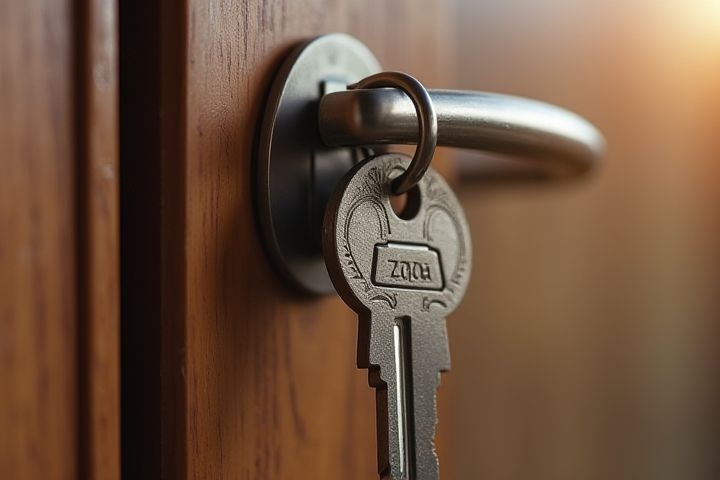
Safely hiding your house keys is crucial for maintaining security and peace of mind. Consider placing your keys in a weatherproof, decorative rock or faux sprinkler head in your garden, as these blend seamlessly with natural surroundings. Another option is to utilize a discreet, magnetic key holder that can be attached securely to an outdoor metal surface like a grill or porch railing, ensuring it's not easily noticed. If you have a trusted neighbor or friend nearby, giving them a spare key provides a reliable backup without compromising your home's security. Ultimately, relying less on common hiding spots, such as under doormats or above door frames, reduces the chances of unauthorized access.
Where To Hide House Keys Safely
Fake rock with hidden compartment.
A fake rock with a hidden compartment is an excellent solution for safely concealing your house keys. These cleverly designed replicas can blend seamlessly into your garden or landscaping, allowing you to maintain a natural aesthetic while securing access to your home. Look for fake rocks made from durable materials that resist weathering and fading; many models even feature realistic textures and colors to further enhance camouflage. Ensure your chosen compartment is spacious enough to hold your keys easily, yet discreet enough to remain unnoticed by casual observers.
Under a garden statue or decoration.
Hiding your house keys under a garden statue or decoration offers a clever and discreet solution to prevent unauthorized access to your home. Choose a statue that blends seamlessly with your landscape, ensuring it's not overly conspicuous; a well-placed gnome, frog, or bird can serve as effective cover. To enhance security, consider securing the keys with a small tether or adhesive to prevent them from being easily removed or blown away. This method not only hides your keys out of plain sight but also adds an aesthetic element to your garden decor.
Inside a locked outdoor box.
One effective way to conceal your house keys is by placing them inside a locked outdoor box, which adds an extra layer of security. Choose a durable and weather-resistant box made of materials like metal or high-grade plastic, ensuring it can withstand harsh outdoor conditions. Utilize a combination or keypad lock for easy access, while minimizing the risk of unwanted entry. For added safety, position the box in a discreet location, such as a garden or behind a decorative element, making it less visible to potential intruders.
Beneath a loose brick or paver.
Hiding your house keys beneath a loose brick or paver provides a discreet and secure location that is often overlooked by potential intruders. This method utilizes natural elements of your landscape, blending seamlessly with your outdoor decor. To enhance security, choose a spot that is not readily visible, ensuring the loose brick or paver is not easily disturbed. When you need access, simply lift the brick or paver, revealing your hidden key while maintaining the integrity of your home's exterior.
Inside a birdhouse with a latch.
Hiding your house keys inside a birdhouse with a latch offers both security and creativity. This discreet location not only blends in with your garden decor but also prevents unwanted access. Ensure the birdhouse has a durable latch to keep your keys secure from curious passersby or wildlife. By using a birdhouse, you can enhance your yard's aesthetic while keeping your keys hidden in a clever and safe manner.
In a waterproof container in a garden.
Hiding your house keys in a waterproof container can provide an effective solution for ensuring safety and accessibility. Choose a durable, rust-resistant container, ideally made of plastic or stainless steel, and place it in a discreet location within your garden, such as beneath a rock or inside a flower pot. This method protects your keys from moisture and prevents rust, ensuring they remain functional year-round. For added security, consider burying the container a few inches underground, making it less obvious to potential trespassers.
Magnetic key holder under metal steps.
A magnetic key holder placed under metal steps offers a discreet and secure location for hiding your house keys. This method ensures that the key remains hidden from plain sight while utilizing the natural camouflage of the metal surface. The strong magnet securely attaches the holder, preventing it from being easily discovered or dislodged. For added security, consider choosing a magnetic key holder designed to withstand varying weather conditions, ensuring your key remains protected all year round.
Behind a downspout or gutter.
Hiding your house keys behind a downspout or gutter offers a discreet and easily accessible location. This area blends seamlessly into your home's exterior, making it less obvious to potential intruders. Ensure that the key is well-secured, perhaps taped or magnetized, to prevent it from falling out during heavy rain or wind. Regular checks on this hidden spot can help you maintain its safety and accessibility for yourself or trusted individuals.
In a shed with a combination lock.
Hiding your house keys in a shed with a combination lock offers both security and convenience. A sturdy shed enhances safety, as it can be locked to deter unauthorized access, while the combination lock adds an additional layer of protection. For optimal security, choose a six-digit combination lock, which significantly reduces the chances of someone guessing the code. This method not only keeps your keys safe but also provides peace of mind, knowing they are securely stored away from potential intruders.
With a trusted neighbor.
Hiding your house keys with a trusted neighbor offers a secure option for quick access while ensuring your home remains protected. When selecting a neighbor, choose someone reliable and familiar with your routine, preferably someone you trust implicitly. It's advisable to inform them about your key arrangement and any specific situations in which you may need access to your home. This method not only keeps your keys out of plain sight but also enhances your security by relying on the trust placed in your immediate community.
